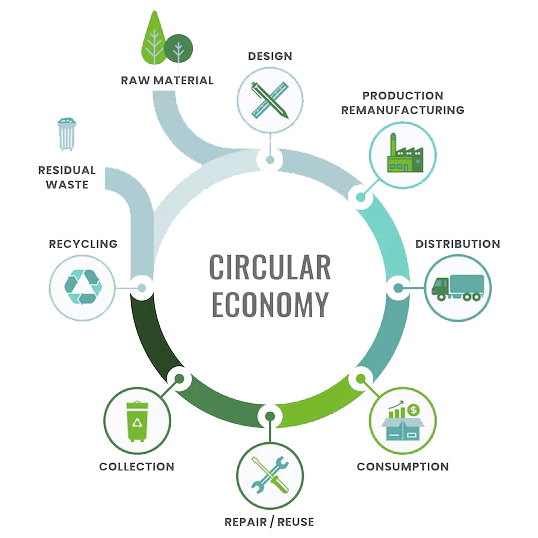Embracing the Circular Economy: A Sustainable Future for Businesses


The traditional linear economy model, characterised by a "take-make-dispose" approach, is increasingly unsustainable. Resource depletion, waste generation, and climate change are pressing challenges that necessitate a fundamental shift in how businesses operate. The circular economy offers a promising alternative, focusing on reducing waste, reusing materials, and regenerating natural systems. This blog explores the importance of the circular economy and how businesses can adopt this model to achieve sustainability goals.
Understanding the Circular Economy
Unlike the linear economy, the circular economy aims to keep products and materials in use for as long as possible. It involves designing out waste and pollution, keeping products and materials in use, and regenerating natural systems. By adopting circular principles, businesses can reduce their environmental impact, enhance resource efficiency, and unlock new business opportunities.


The Imperative for Business Adoption
There are several compelling reasons why businesses should embrace the circular economy:
Resource Scarcity: The depletion of natural resources is a growing concern. By adopting circular principles, businesses can reduce their reliance on finite resources and secure long-term supply chains.
Cost Savings: Waste reduction, increased product lifespan, and efficient resource utilisation can lead to significant cost savings.
Risk Mitigation: Circular economy strategies can help businesses mitigate risks associated with supply chain disruptions, price volatility, and regulatory changes.
Enhanced Brand Reputation: Consumers are increasingly conscious of environmental impact. Demonstrating a commitment to sustainability can enhance brand reputation and attract environmentally conscious customers.
Regulatory Compliance: Many governments are introducing regulations to promote circular economy practices. By adopting these principles, businesses can ensure compliance and avoid potential penalties.
Financing the Transition: Services That Will Help Your Business Become More Sustainable
To facilitate the shift to a circular economy, innovative financing options are emerging. That's why at Qual we offer:
Tech-as-a-Service: Tech-as-a-Service allows you to combine your hardware, software, and services into a single solution. Get access to the latest technology, optimise your IT budgets and simplify your bill. By providing technology on a subscription basis, TaaS can extend the lifecycle of hardware, which reduces the number of discarded devices that end up in landfills.
Trade-in Services: We can help manage your refresh cycle by offering a single solution for all your trade-in requirements. Realise the value of your old equipment by trading it in against new technology. Any devices with no value, we can recycle sustainably according to ISO 14001 and ISO 9001 environmental standards. Save time, money and the environment!


By embracing the circular economy, businesses can not only contribute to a more sustainable future but also gain a competitive advantage by keeping ahead of the game with the latest technology and unlock new growth opportunities. Ultimately, adopting circular economy principles is a smart and responsible decision for businesses, leading to a greener future for all. Learn more about the Circular Economy and how our finance options can help you achieve sustainable growth:
